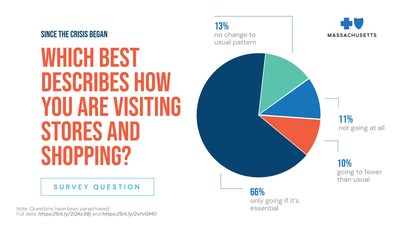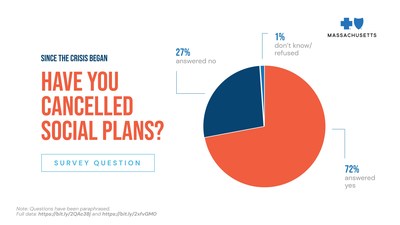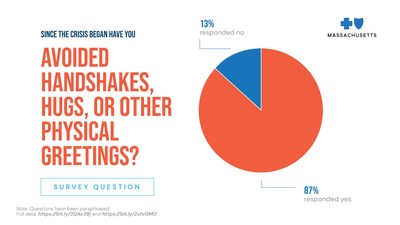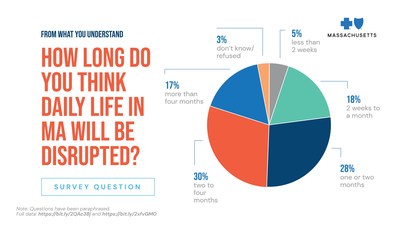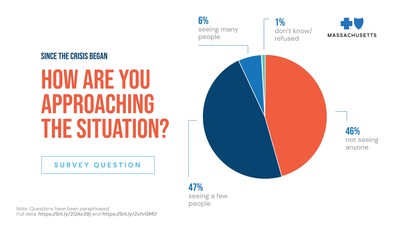BOSTON, March 21, 2020 /PRNewswire/ -- Massachusetts residents view the coronavirus strain COVID-19 as a serious and worsening threat and are bracing for a long road ahead. More than 70% believe disruptions will last a month or more, and 46% foresee two or more months of upheaval. The findings are part of the first wave of data from a statewide Blue Cross Blue Shield of Massachusetts/ MassINC Polling Group tracking poll.
The poll was conducted March 16-19, 2020 by the MassINC Polling Group among a representative sample of Massachusetts residents. The weekly survey will monitor key elements of public opinion and reaction in the days and weeks to come. Each wave will be made publicly available for state and local leaders as well as residents, researchers and the media. The survey was commissioned as part of Blue Cross' broader efforts to support the community's response to COVID-19.
"Up to now, we have had relatively little data reflecting how Massachusetts residents are reacting to the crisis and what they are prepared for going forward," said Steve Koczela, president of The MassINC Polling Group, who is overseeing the poll. "This is what a survey like this is meant to provide, filling in critical information gaps to enable leaders to act with confidence."
The vast majority of those surveyed have changed their socializing, shopping and personal habits. However, a sizeable minority -- representing hundreds of thousands of residents of the state -- are not taking the isolating actions experts say will help slow the spread of the pandemic.
"Staying away from other people may be a sacrifice and it may be hard, but it's also the kindest possible thing people can do right now," said Katherine Dallow, MD, MPH, vice president of clinical programs and strategy at Blue Cross. "Continued emphasis on social distancing, frequent handwashing, and staying home when travel is not essential and especially when sick is critical."
Key findings
- Most residents are taking the personal actions needed to help "flatten the curve" and keep infections at a level the health care system can manage. But a small minority have not changed their daily habits: 13% say they are still using physical greetings like hugs and handshakes; 14% say they have not changed their handwashing habits; 13% say they have not changed their usual shopping patterns; and 6% say they are still "seeing or visiting many people." Six percent represents approximately 400,000 residents of Massachusetts.
- Residents understand the degree of threat, with 88% calling it a serious threat to the people of Massachusetts. Most say the outbreak is still becoming more serious at this phase (66%). One sign that that public is paying attention to the details: a near-unanimous 96% of residents say coronavirus poses a very or somewhat serious threat to the elderly.
- The pandemic is dominating the news and public attention in an unprecedented way, with 67% of residents reporting they are following news about coronavirus "very closely." The public is also aware of specific facets of the story, with 69% aware of the shortage of coronavirus tests that has hampered the public response.
- In the absence of testing, public officials have resorted to sweeping social distancing measures, amounting to a near-lockdown in some areas. Here in Massachusetts, most say the response in their own area has been about right (64%), while another 23% say it should go further. The disruptions to everyday life have been universal, and just 23% see the upheaval lasting less than a month.
- As the economic impact of the pandemic takes hold, working residents report changes to their habits as well. Some are in a position to continue their employment remotely, but this is far from universal, with just 48% of employed residents saying they have worked remotely during the crisis. There is a stark socioeconomic divide - just 31% of hourly workers have worked from home, compared to 67% of salaried workers.
In response to the COVID-19 pandemic, Blue Cross has expanded coverage and access to care for its members, and launched a regularly updated resource center that includes information about how to stay safe, a downloadable tip sheet for employers, a video featuring a Blue Cross physicians, and answers to frequently asked questions. In addition, Blue Cross' health news site, Coverage, produces timely, original news articles reporting what health consumers need to know about COVID-19.
Full survey results can be found here and here.
Methodology
These results are based on a statewide survey of 603 residents of Massachusetts. Live telephone interviews were conducted March 16-19, 2020 via both landline and cell phone as part of a tracking survey. The final data was weighted to known and estimated parameters on gender, age, race, country, and education. The margin of sampling error is 4.0 percentage points with a 95 percent level of confidence.
About Blue Cross Blue Shield of Massachusetts
Blue Cross Blue Shield of Massachusetts (www.bluecrossma.com) is a community-focused, tax-paying, not-for-profit health plan headquartered in Boston. We are committed to the relentless pursuit of quality, affordable health care with an unparalleled consumer experience. Consistent with our promise to always put our members first, we are rated among the nation's best health plans for member satisfaction and quality. Connect with us on Facebook, Twitter, YouTube, and LinkedIn.
About the MassINC Polling Group
The MassINC Polling Group is a nonpartisan public opinion research firm serving public, private, and social-sector clients. MPG elevates the public's voice with cutting edge methods and rigorous analysis. Based in Boston, MPG serves a nationwide client base.
SOURCE Blue Cross Blue Shield of Massachusetts







